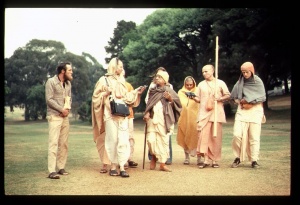SB 7.9.1: Difference between revisions
No edit summary |
(Vanibot #0054 edit - transform synonyms into clickable links, which search similar occurrences) |
||
| Line 24: | Line 24: | ||
<div class="synonyms"> | <div class="synonyms"> | ||
''śrī-nārada uvāca'' | ''[//vanipedia.org/wiki/Special:VaniSearch?s=śrī&tab=syno_o&ds=1 śrī]-[//vanipedia.org/wiki/Special:VaniSearch?s=nārada&tab=syno_o&ds=1 nārada] [//vanipedia.org/wiki/Special:VaniSearch?s=uvāca&tab=syno_o&ds=1 uvāca]'' — the great saintly sage Nārada Muni said; ''[//vanipedia.org/wiki/Special:VaniSearch?s=evam&tab=syno_o&ds=1 evam]'' — thus; ''[//vanipedia.org/wiki/Special:VaniSearch?s=sura&tab=syno_o&ds=1 sura]-[//vanipedia.org/wiki/Special:VaniSearch?s=ādayaḥ&tab=syno_o&ds=1 ādayaḥ]'' — the groups of demigods; ''[//vanipedia.org/wiki/Special:VaniSearch?s=sarve&tab=syno_o&ds=1 sarve]'' — all; ''[//vanipedia.org/wiki/Special:VaniSearch?s=brahma&tab=syno_o&ds=1 brahma]-[//vanipedia.org/wiki/Special:VaniSearch?s=rudra&tab=syno_o&ds=1 rudra]-[//vanipedia.org/wiki/Special:VaniSearch?s=puraḥ&tab=syno_o&ds=1 puraḥ] [//vanipedia.org/wiki/Special:VaniSearch?s=sarāḥ&tab=syno_o&ds=1 sarāḥ]'' — represented by Lord Brahmā and Lord Śiva; ''[//vanipedia.org/wiki/Special:VaniSearch?s=na&tab=syno_o&ds=1 na]'' — not; ''[//vanipedia.org/wiki/Special:VaniSearch?s=upaitum&tab=syno_o&ds=1 upaitum]'' — to go before the Lord; ''[//vanipedia.org/wiki/Special:VaniSearch?s=aśakan&tab=syno_o&ds=1 aśakan]'' — able; ''[//vanipedia.org/wiki/Special:VaniSearch?s=manyu&tab=syno_o&ds=1 manyu]-[//vanipedia.org/wiki/Special:VaniSearch?s=saṁrambham&tab=syno_o&ds=1 saṁrambham]'' — in a completely angry mood; ''[//vanipedia.org/wiki/Special:VaniSearch?s=su&tab=syno_o&ds=1 su]-[//vanipedia.org/wiki/Special:VaniSearch?s=durāsadam&tab=syno_o&ds=1 durāsadam]'' — very difficult to approach (Lord Nṛsiṁhadeva). | ||
</div> | </div> | ||
Latest revision as of 23:08, 18 February 2024

A.C. Bhaktivedanta Swami Prabhupada
TEXT 1
- śrī-nārada uvāca
- evaṁ surādayaḥ sarve
- brahma-rudra-puraḥ sarāḥ
- nopaitum aśakan manyu-
- saṁrambhaṁ sudurāsadam
SYNONYMS
śrī-nārada uvāca — the great saintly sage Nārada Muni said; evam — thus; sura-ādayaḥ — the groups of demigods; sarve — all; brahma-rudra-puraḥ sarāḥ — represented by Lord Brahmā and Lord Śiva; na — not; upaitum — to go before the Lord; aśakan — able; manyu-saṁrambham — in a completely angry mood; su-durāsadam — very difficult to approach (Lord Nṛsiṁhadeva).
TRANSLATION
The great saint Nārada Muni continued: The demigods, headed by Lord Brahmā, Lord Śiva and other great demigods, dared not come forward before the Lord, who at that time was extremely angry.
PURPORT
Śrīla Narottama dāsa Ṭhākura has sung in his prema-bhakti-candrikā, 'krodha' bhakta-dveṣi jane: anger should be used to punish a demon who is envious of devotees. Kāma, krodha, lobha, moha, mada and mātsarya—lust, anger, greed, illusion, pride and envy—all have their proper use for the Supreme Personality of Godhead and His devotee. A devotee of the Lord cannot tolerate blasphemy of the Lord or His other devotees, and the Lord also cannot tolerate blasphemy of a devotee. Thus Lord Nṛsiṁhadeva was so very angry that the great demigods like Lord Brahmā and Lord Śiva and even the goddess of fortune, who is the Lord's constant companion, could not pacify Him, even after offering prayers of glorification and praise. No one was able to pacify the Lord in His anger, but because the Lord was willing to exhibit His affection for Prahlāda Mahārāja, all the demigods and the others present before the Lord pushed Prahlāda Mahārāja forward to pacify Him.